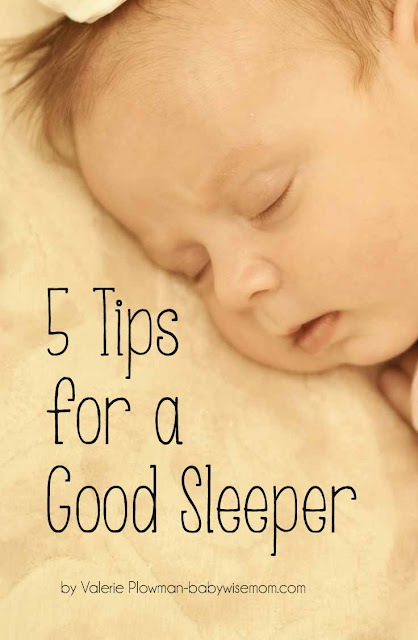I'm so excited to have Valerie, from Chronicles of a Babywise Mom back to guest post today! (Val guest posted here back in October when she shared A Beginner's Guide To Childhood Chores and it is worth checking out if you missed it the first round!)
There I was, laying on the floor next to the baby swing. I was close to tears. My first baby was only a week old and I was desperate for him to fall asleep. I didn't want much. It was the middle of the night. I just wanted a bit of sleep. I had many nights that I was literally awake all night long because he would not fall asleep. The whole night. The child fought sleep with every ounce of his being, even as a newborn. Sleeping like a baby? Ha! Boy did I have a shock. He was not a sleeper like many newborns are. Nope. He seemed to hate sleep.
As I look back on that time, I am grateful. Crazy, right?!? I know. Why on earth would I be grateful for that? Because I grew. We grow the most in the times we are the most uncomfortable. I grew in my knowledge of infant sleep because I had to. I literally had to. I had to get him sleeping like a baby so that both of us could survive. Most of what I learned about troubleshooting sleep for babies was learned from being his mother.
To have a good sleeper really is not as complicated as it might seem. It boils down to a handful of tips.
Teach Your Child to Fall Asleep Without Help
First, you want your baby to be able to fall asleep on his own without help. This means without you rocking him to sleep, without being fed until asleep, etc. He goes to bed awake and falls asleep. This is also known as self-soothing.
There are many ways out there to teach a baby to self-soothe. My personal favorite is the 4 S's from the Baby Whisperer. This method completely teaches self-soothing without having to do much if any crying. Another effective and fast method is Cry it Out.
Avoid Unnecessary Sleep Props
The next tip to keep in mind is to avoid using unnecessary sleep props. Notice I used the qualifying word "unnecessary." I didn't say "any." Keep in mind that you want your child to be able to fall asleep on her own. If you put her in the swing for every nap, she will not be learning to sleep on her own in the least. This is probably not a prop you want to use for every nap. However, that doesn't mean that you can't ever turn to the swing.
There are many props people use regularly. One is a pacifier. You might decide a pacifier is worth the prop. Another prop is white noise. White noise can be something your child really needs to sleep well, but having the white noise can make the difference between taking nice 2 hour naps or waking fully at the 45 minute mark. I didn't use white noise for my first two babies, but did for my last two. I needed some buffer for the last two since I had more children who were older and noisier in the house. Babies sleep almost all day and I didn't want my older children to have to only speak in whispers for half a year at least.
So when thinking about something that can be a prop, decide what benefit you gain, what potential drawbacks there are, and weigh the benefits and drawbacks against each other. Every prop will have its downsides. Use the props you feel are warranted and avoid the ones you feel are not.
Understand Optimal Waketime Length
Waketime length is something I messed up big time with my oldest. I didn't even realize it until my second baby came along. He finally started napping better once his age caught up to the amount of time I was keeping him awake. I thought he had finally figured sleep out, but he had just gotten old enough to be able to sleep well with the waketime I was giving him.
As adults who don't know better, we think that a tired baby will sleep better. Um...no. No, we learn as parents that an overly tired baby does not sleep well at all. And this is true of people of all ages! The day does come you crash, but until that point, you are not sleeping well.
Keep waketime length optimal for his age and for his personal preferences (actual, not imagined. By that I mean, keep waketime length to the length he sleeps best at, not at what he wants to be awake for--I am thinking toddlers when I say this). I have some great information to walk you through this process.
Have Consistency Day to Day
Finally, you need to have consistency from day to day. You can have some times you go off the normal routine, but you want most days to have naps at the same times and same place. You want baby to wake up at the same time each day and go to bed at the same time each day. If you do this, your baby's body will come to expect sleep at those times of day and be ready for it. Establishing consistency usually requires some sacrifices, but it is worth it to get that predictability and get your baby sleeping well!
Have a Sleep Hierarchy
Have some goals in mind. What is your main sleep goal? What needs to happen for that main goal to be met? I have a sleep hierarchy for newborns and also one for babies 3-6 months. If you read those, you will get an idea of what I mean by hierarchy and be able to make your own.
Conclusion
Did my oldest eventually learn to sleep? Yes! He became a fantastic sleeper. He was predictable. He went to sleep awake and went to sleep. He could sleep in other houses. My first born learned to sleep like a baby--the way we dream they should. And indeed, my three girls followed suit. Following these tips can help you have your baby sleeping like a baby, too.
Valerie is the mother to four (11, 9, 7, and 3) and blogs at BabyWiseMom.com.








great share Carrie
ReplyDelete